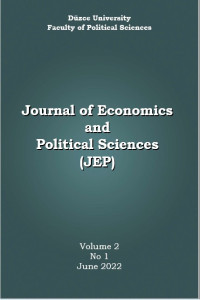İklim Değişikliğinin Makro İktisadı
Bu çalışmada, 1970’lerden itibaren gelişen iklim değişikliği iktisadı incelenmiştir. Uluslararası gündemi giderek daha yoğun şekilde meşgul eden iktisadi bir sorun olarak iklim değişikliği, sebepleri, etkileri, ekonomik maliyetleri ve alınabilecek tedbirler açısından oldukça kapsamlı bir tartışmaya konu olmuştur. Fiziksel, ekonomik, siyasi pek çok boyutta farklı görüşleri içeren çalışmalar, seçilmesi gereken mücadele yöntemleri konusunda yaşanan ikilemleri yansıtmaktadır. İncelenen konu yüksek derecede risk vebelirsizlik içerdiği, mekansal ve zamansal boyutları çok geniş olduğu ve uluslararası işbirliği içerisinde alınıp uygulanacak tedbirleri zorunlu kıldığı için iktisadi incelemelerin diğer konularından ayrışmaktadır. Dolayısıyla, daha kapsamlı analizlerin elde edilebilmesi için çatışan yaklaşımların da birbirlerini destekler nitelikte yeniden kurgulanması gereği ortaya çıkmaktadır. Bu nedenle, neoklasik ve keynesyen temelli analizlerin ortak amacına vurgu yapmak önem arz etmektedir.
Anahtar Kelimeler:
İklim Değişikliği, Sürdürülebilirlik, Modelleme, Risk, Belirsizlik
___
- Andersson, M., Baccianti, C. ve Morgan, J. (2020). Climate change and the macroeconomy. ECB Occasional Paper, (2020243).
- Bowen, A., Campiglio, E. ve Tavoni, M. (2014). A macroeconomic perspective on climate change mitigation: Meeting the financing challenge. Climate Change Economics, 5(01), 1440005.
- Dafermos, Y., Nikolaidi, M. ve Galanis, G. (2018). Climate change, financial stability and monetary policy. Ecological Economics, 152, 219-234.
- Dixon, P. B. ve Jorgenson, D. (2013). Introduction. (İçinde) Handbook of computable general equilibrium modeling. (Eds.) Dixon, P. B., ve Jorgenson, D., 1-22.
- Drupp, M. A., Baumgärtner, S., Meyer, M., Quaas, M. F. ve von Wehrden, H. (2020). Between Ostrom and Nordhaus: The research landscape of sustainability economics. Ecological Economics, 172, 106620.
- Feyen, E., Utz, R., Zuccardi Huertas, I., Bogdan, O. ve Moon, J. (2020). Macro-financial aspects of climate change. The World Bank.
- Fisher-Vanden, K. ve Weyant, J. (2020). The Evolution of Integrated Assessment: Developing the Next Generation of Use-Inspired Integrated Assessment Tools. Annual Review of Resource Economics, 12, 471-487.
- Gümüş, B. ve Buluş, A. (2020). Uluslararası Çevre Sorunları Ve William Nordhaus’un Çevre Ekonomisine Katkıları. Alanya Akademik Bakış, 4(3), 1015-1031.
- Hagens, N. J. (2020). Economics for the future–Beyond the superorganism. Ecological Economics, 169, 106520.
- Hamilton, K. ve Atkinson, G. (2006). Wealth, welfare and sustainability: Advances in measuring sustainable development. Edward Elgar Publishing.
- Hardt, L., & O'Neill, D. W. (2017). Ecological macroeconomic models: assessing current developments. Ecological Economics, 134, 198-211.
- IPCC –InternationalPanel on Climate Change (2019). IPCC, 2018: Global Warming of 1.5°C.
- Kahn, M. E., Mohaddes, K., Ng, R. N., Pesaran, M. H., Raissi, M., ve Yang, J. C. (2019). Long-term macroeconomic effects of climate change: A cross-country analysis(No. w26167). National Bureau of Economic Research.
- Klein, R. J., Huq, S., Denton, F., Downing, T. E., Richels, R. G., Robinson, J. B., ve Toth, F. L. (2007). Inter-relationships between adaptation and mitigation.
- Nordhaus, W. D. (1996). A Regional Dynamic General-Equilibrium Model of Alternative Climate-Change Strategies. The American Economic Review, 86(4), 741-765.
- Nordhaus, W. D. (2008). A Question of Balance Weighing the Options on Global Warming Policies.
- Nordhaus, W. D. (2013a). The Climate Casino: Risk, Uncertainty, and Economics for a Warming World.Yale University Press.
- Nordhaus, W. D. (2013b). Integrated Economic and Climate Modeling. (içinde) Handbook of Computable General Equilibrium Modeling, (Ed.) Dixon, P. B. ve Jorgenson, D. W., 1069-1131.
- Nordhaus, W. (2018). Projections and uncertainties about climate change in an era of minimal climate policies. American Economic Journal: Economic Policy, 10(3), 333-60.
- Nordhaus, W. D. (2019). Climate change: the ultimate challenge for economics. American Economic Review, 109(6), 1991-2014.
- Nordhaus, W. D. (2021). Climate Club Futures: On the Effectiveness of Future Climate Clubs.
- Owen, A. D. ve Hanley, N. (2004). Introduction. (içinde) The Economics of Climate Change, Owen, Antony D. ve Hanley, Nick (Ed .), 1-5.
- Pindyck, R. S. (2013). Climate change policy: What do the models tell us?. Journal of Economic Literature, 51(3), 860-72.
- Rezai, A. (2011). The opportunity cost of climate policy: a question of reference. The Scandinavian Journal of Economics, 113(4), 885-903.
- Rezai, A., Taylor, L. ve Mechler, R. (2013). Ecological macroeconomics: An application to climate change. Ecological Economics, 85, 69-76.
- Roos, M. ve Hoffart, F. M. (2021). Climate Economics: A Call for More Pluralism and Responsibility.Springer Nature.
- Stern, N. (2008). The economics of climate change. American Economic Review, 98(2), 1-37.
- Stern, N. (2013). The structure of economic modeling of the potential impacts of climate change: grafting gross underestimation of risk onto already narrow science models. Journal of Economic Literature, 51(3), 838-59.
- Stern, N. ve Stiglitz, J. E. (2021). The social cost of carbon, risk, distribution, market failures: An alternative approach(No. w28472). National Bureau of Economic Research.
- Stiglitz, J. E. (2019). Addressing climate change through price and non-price interventions. European Economic Review, 119, 594-612.
- Stiglitz, J. E., Stern, N., Duan, M., Edenhofer, O., Giraud, G., Heal, G. M., ... ve Winkler, H. (2017). Report of the high-level commission on carbon prices.
- Tagliapietra, S., ve Wolff, G. B. (2021). Form a climate club: United States, European Union and China.
- Tol, R. S. (2020). Selfish Bureaucrats and Policy Heterogeneity in Nordhaus’ dice. Climate Change Economics, 11(04), 2040006.
- Van der Mensbrugghe, D. (2013). Modeling the Global Economy e Forward-Looking Scenarios for Agriculture. (içinde) Handbook of Computable General Equilibrium Modeling,(Ed.) Dixon, P. B. ve Jorgenson, D. W., 933-994.
- Başlangıç: 2021
- Yayıncı: Düzce Üniversitesi
Sayıdaki Diğer Makaleler
Rumeli ve Kafkasya’dan Atranos’a Göçler ve Göçmenlerin İskânı (1895-1910)
İklim Değişikliğinin Makro İktisadı
Arap Baharı Döneminde Rus Dış Politikası
Ahmed Rıza ve Prens Sabahaddin Beyler’in Devrime Bakışları
İbn Haldun’un Umranında Çiftçilik Sanatı ve Neo-Liberal Düzende Dönüşen Tarım Politikaları
